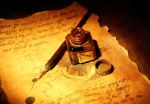02/05/2013
When my brother Jim suggested that we write a fantasy novel, I agreed to work with him under the condition that we didn’t write “sword and sorcery.” I wanted a society with a late 18th or early 19th century level of technology with a blending of science, engineering, and magic.
As we started building the world for our story, we took time to define the rules; the physical laws by which our world would operate.
Jim has a BS in Electrical Engineering and an MS in Food Engineering. Contrary to what you might think, Food Engineering has nothing to do with creating recipes. Rather, it is the engineering involved in designing industrial machines for food processing.
I have a BS in Computer Science and spent a dozen years in satellite operations where I had to apply knowledge learned in past engineering courses. I think it’s safe to say that we both have a pretty strong technical background, and as such wanted the physics of our world to be internally consistent and well thought-out. And above all else, no Deus Ex Machina; all problem resolutions must be resolved using the laws of physics set in place elsewhere in the book.
A central plot point of Duck Blood Soup is the introduction of a new, magical, non-polluting power source based upon scarce resources. The applications that immediately came to mind were military and commerce – power and greed. We spent a considerable amount of time researching basic designs for airship kept aloft and controlled by this new, magical substance, as well as steam powered locomotives which leveraged this new pollution free power source.
As the story developed we considered how the new substance would affect the lives of the people in our world. Who could afford the new inventions and who would be stuck using technology that was invented before its discovery?
Firearms, specifically muskets and early rifles played a key role in Duck Blood Soup. We needed to find out about conditions in arms factories of the time period as well as the manufacturing processes used at the time. We spent time researching how muskets work as well as early pitfalls in musket and rifle design. The research into early firearms provided a sense of reality to our manufacturing process, weapons availability, and usage in battle.
A real concern we had was applying what we had learned about the laws of physics to the world we were creating. Obviously magic violates all sorts of rules, giants would be crushed by their own weight in our world, human sized creatures might glide but never fly on an earth-like planet, and so on.
We knew all of that going in, but there were some rules we would not break: we would not violate the laws of thermodynamics. If a wizard used magic, it took energy. Use a lot of magic and the wizard would become exhausted and risk death. A fat wizard? Not possible if you assume that casting a spell burns calories. A spell that lasted forever? If you moved something by magic it would stay where you put it but any other spell would gradually fade away.
Likewise, a well-educated wizard would understand both the laws of magic and the laws of physics and could use this knowledge to his advantage. There is one battle scene where an army wizard uses some basics knowledge of physics to provide a magical solution to a physical problem.
By applying what we learned in engineering classes, I think we created a world that is consistent with most laws of the universe, and provides limits and rules to physical laws we break to add concepts such as magic.
-=/-\=-
The original post can be found here and you can find out more about the Hofer brothers and their book, Duck Blood Soup, on their website.
Check out Snarktastic Sonja’s review of Duck Blood Soup and the Hofers Author Interview.

